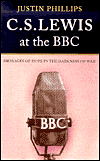C.S. Lewis in a Time of War does have quite a bit about C.S. Lewis, particularly his broadcasting career, and it does keep coming back to him, but this is also - if not primarily - a history of the BBC, with an emphasis on its religious broadcasting. Which is not a bad thing. There is, for instance, an entire chapter on Dorothy Sayers and her battle to have The Man Born to Be King broadcast as she thought it ought to be broadcast. Sayers, in fact, shows up several places. There is quite a bit on how the founders of the BBC saw it largely as a medium to spread civilizing influences, particularly the Christian gospel. There is quite a bit on how the BBC coped with World War II, the hits it took, the moves it made to not only help insure its own survival but also to enhance national security. (Did you know, for instance, that it was decided to keep the news announcers few in number and have them state their names on air, so that the public would come to recognize each voice, so that enemy impostors - if any should manage to get on the air - would be instantly noticeable?) There is also some good, general recounting of life outside broadcasting during World War II. But the book by no means confines itself to the World War II years, either.
The author, Justin Phillips, was a journalist with the BBC for many years. He was also an elder at his church. According to the jacket copy, he'd completed the manuscript for this book when he died in 2000, but his daughter Laura Treneer oversaw the final editing and brought the book to publication.
Phillips makes a convincing argument that working with his editors at the BBC - learning to write for a radio audience with the help of good producers - turned C.S. Lewis into a better writer overall, and that the collaboration that went into the radio broadcasts strongly influenced Mere Christianity, and for the better. Certainly, that Lewis had ardent advocates of ecumenical Christianity at his back, trying to use his broadcasts to reinvent religious broadcasting, had to have made a difference.
At any rate, this book comes across as a labor of love, but not a puff piece. Phillips freely acknowledges that the BBC has made some serious missteps along the way, including in its relationships with both Lewis and Sayers. In that regard, this book also ranges into the "how to be a better manager" field, for anyone willing to take to heart the lessons of a bad example or two. (For example: Don't turn a prissy and territorial schoolmarm type assistant loose to correspond with anyone like Dorothy Sayers. You'll be hard pressed to pick up the pieces after the dust settles.)
Many books come across as something that someone else might have written had they only put their mind to it, but this one, I think, could not have been pulled off without Phillips, with his background, enthusiasm, and attention to detail. The chapters are well end-noted, for anyone wanting to dig deeper. For sources, he relied on not only written material, but archived audio, and interviews he conducted himself. It's a nice contribution overall to Lewis studies, but also gives a look at World War II from a fresh angle. On top of that, Phillips weaves in a bit of Christian apologetics of his own, building on what Lewis said in Mere Christianity and the broadcasts that preceded it.
On top of everything else, it shows how the BBC put itself on war footing for World War II, keeping national interests uppermost while fighting whatever looked like government encroachment upon its turf.
All in all, a nice behind-the-scenes look.

C. S. Lewis in a Time of War: The World War II Broadcasts That Riveted a Nation and Became the Classic Mere Christianity
One question, though. Does anyone know if that book is the same as the following? Or does it cover much the same ground in a different fashion? The former was published by HarperSanFrancisco earlier this year, and my copy says it's a first edition. I don't see any notice that it was previously published elsewhere. But the following, published a few years ago by Zondervan, certainly sounds like the same book?
C. S. Lewis at the BBC: Messages of Hope in the Darkness of War
Clicking on a book cover will take you to Barnes & Noble.

No comments:
Post a Comment